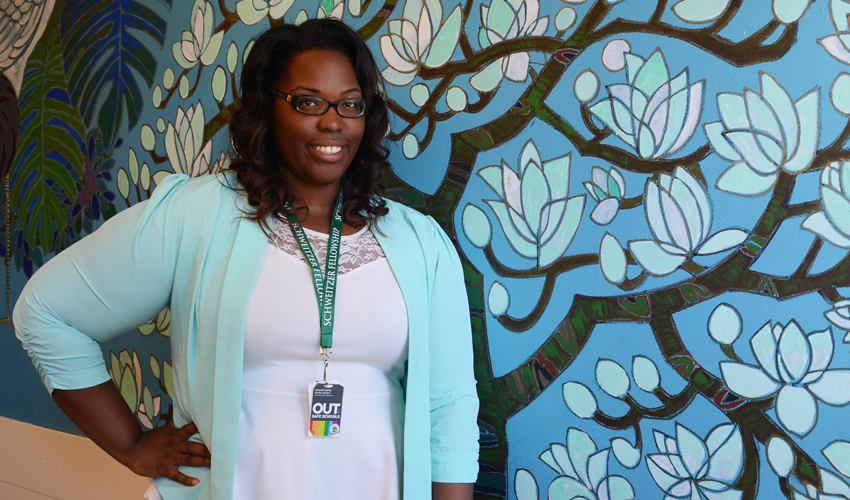Newly named Schweitzer Fellow proud to feed families in need

SF State master's of public health student Hana Shirriel, a member of the 2016-17 class of San Francisco Schweitzer Fellows, will be furthering a food pantry project she established at West Oakland Middle School in 2015.
Hana Shirriel, a master of public health (MPH) graduate student with San Francisco State University's College of Health and Social Sciences, was recently selected by the Albert Schweitzer Fellowship (ASF) to be one of its 2016-17 class of San Francisco Schweitzer Fellows.
It's the ASF's mission to prepare the next generation of professionals who will serve and empower vulnerable people to live healthier lives and create healthier communities. Fellows create and carry out sustainable community service projects addressing chronic health issues and the underlying causes of health inequities in society, including poverty, education and the environment.
Shirriel is one of 15 graduate students selected to represent the ASF's San Francisco Bay Area chapter, which is one of the 14 U.S.-based Schweitzer programs. She is also the only MPH student and the only student from a California State University in this year's Bay Area class, which includes representatives from Samuel Merritt University, Stanford University and the University of California, San Francisco.
The Bay Area Fellows will join approximately 240 other 2016-17 Schweitzer Fellows working at program sites around the United States, as well as one in Lambaréné, Gabon, at the site of the Albert Schweitzer Hospital, founded by Schweitzer in 1913.
"Being able to bring my holistic MPH perspective into play on everything that we [the ASF Fellows] talk about is going to be really exciting," Shirriel said. "I'm just really honored and humbled to be around some of the brightest minds that are out there who are growing into the future leaders of this world."
In an effort to address the social factors that impact health, Shirriel and the other Schweitzer Fellows will each spend the next year developing and implementing service projects that address the root causes of health disparities in under-resourced communities. Shirriel will be building upon a food pantry project she started at West Oakland Middle School in 2015.
The pantry, established in collaboration with LifeLong Medical Care (where Shirriel currently works as the coordinator of adolescent services) and the Alameda County Community Food Bank, holds two distributions each month and typically serves more than 60 Oakland-area families at each distribution. In addition to sorting and distributing food to those in need, Shirriel and her assistants also enjoy surveying and speaking with the pantry participants about an assortment of health-related topics, including how to modify recipes to prepare healthier meals and how proper nutrition can directly affect the overall well-being of individuals and families alike.
Since establishing the pantry, Shirriel, an East Bay native who grew up having to rely on similar social and government services during hard times, has taken a great deal of pride in giving back to a community with which she deeply identifies. "My passion comes from personal experience, so it feels great being able to help my [pantry] families knowing that my own family was once in their position," she said. "We've come a long way to build trust and rapport with these families, and we serve them with dignity so they never have to feel shamed."
Eager to assist more families in the future, Shirriel is working toward one day replicating and expanding her food pantry project to cover more "food desert" locations throughout Alameda County. "Places like West Oakland don't have a lot of healthy resources nearby, so we started the pantry to meet a serious need that was there," she said. "It's a real honor to know that we're doing something right and something that can be replicated."
"What I find most impressive about Hana is how she balances her passion with pragmatism, combined with her commitment to helping youth and their families advocate for themselves to improve their overall quality of life," said Professor and Chair of Health Education Mary Beth Love, Shirriel's faculty advisor. "Our department is very proud of Hana's accomplishments to date, and we look forward to seeing what the future holds for her career in the health field."
Schweitzer Fellows work under the close guidance of community and academic mentors, like Love, during their fellowship year, in addition to receiving intensive leadership training so they can go on to inspire others to improve the health of those experiencing barriers to care. To date, more than 3,200 Schweitzer Fellows have delivered nearly 500,000 hours of service to nearly 300,000 people in need.
"Thinking about who [Schweitzer] was — very selfless, giving and dedicated to a life of service — is really important," Shirriel said. "I appreciate how he acknowledged that we have major health issues all over the globe that need to be solved, and as humans we have the capacity to solve many of these problems — from places that seem very far away, like West Africa, to places nearby, like West Oakland."